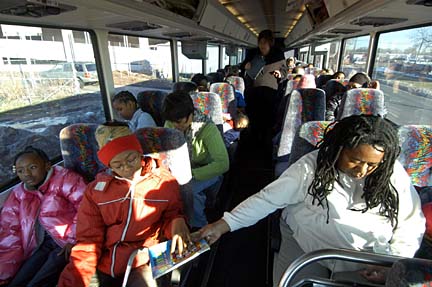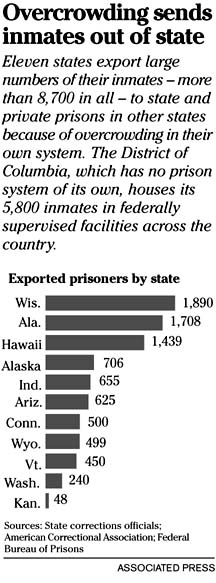
ASSOCIATED PRESS / DECEMBER 2003
Georgia Thompson, right, hands a comic book to her granddaughters -- Ishia Lilburn, 12, center, and Niyah Thompson, 6 -- as they begin the long bus ride from Hartford, Conn., to Jarratt, Va., where they will visit Thompson's imprisoned son, Anthony. Connecticut lacks cell space in its own prison system.
Inmate exports tax families
Hawaii joins 10 states in shipping
off large numbers of prisoners
for lack of cell space
NEW HAVEN, Conn. >> Connecticut is compact, barely 100 miles from end to end. Yet when Barbara Fair and Anne McNamara want to visit their sons, they face a drive of eight or nine hours -- to a small Virginia town where 500 Connecticut men are imprisoned for lack of cells in their own state.
"It's a big expense, but a necessary expense," said McNamara, whose son is serving 25 years for manslaughter. "If they can't see the face of a loved one, and know they have support on the outside, what's the incentive to behave, to learn, to work, to look for the day they can be free?"
Grueling and costly as the 500-mile trip from Connecticut to Jarratt, Va., can be, it is short compared to the distances separating some families with an inmate relative.
Hawaii sends prisoners to Oklahoma; Alaska ships them to Arizona. Vermont has just signed a contract to house up to 700 inmates in private prisons in Kentucky and Tennessee.
In all, according to an Associated Press survey, 11 states export large numbers of their inmates -- a total of about 8,700 -- because of space shortages. In addition, the District of Columbia, with no prisons of its own, has about 5,800 inmates scattered in federal and private prisons nationwide.
To governors and legislators, exporting inmates can be a tempting, low-cost alternative to building new prisons or expanding old ones. Private prisons -- which house most of the out-of-state inmates -- generally charge less per inmate than a state would pay to imprison them at home.
Some officials see the disruption in prisoners' lives as their own fault: If they hadn't committed crimes, they wouldn't be in this position.
But for the inmates' families, out-of-state transfers add an extra degree of anguish to the hardships caused by any incarceration. Barbara Fair, for example, has three sons in prison for drug-related convictions, but says the pain of separation is felt most keenly by Keijam Tucker, her son in Virginia, because he now rarely sees his three young daughters.
Even though most of the Connecticut inmates find the visitation and smoking policies more lenient in Jarratt than at Connecticut prisons, Tucker, 28, has formally requested a transfer back to his home state -- to no avail.
"He'd take the deplorable conditions here in Connecticut just to see his daughters," said Fair, 55, a social worker in New Haven. "They're growing up without him."
Fair is a member of People Against Injustice, one of several groups lobbying Connecticut officials to end the out-of-state transfers. Activists say the state should reduce prison crowding through sentencing reforms and the option of treatment programs for nonviolent drug offenders.
Also lobbying against the transfer are unionized prison guards, who resent the concept of paying Virginians to confine Connecticut citizens.
Thus far, the protests have failed; instead, the legislature recently authorized the possible transfer of 2,500 inmates out of state, up from the previous cap of 500.
Robert Farr, ranking Republican on Connecticut's House Judiciary Committee, said the out-of-state transfers save up to $10,000 per inmate while relieving crowding so severe that some inmates sleep on cots in hallways and cafeterias. These factors outweighed inconvenience for inmates' relatives, he said.
Stacy Smith, a spokes- woman for Connecticut's Department of Corrections, said the transfers to Virginia are not punitive, and the selected inmates represent a cross-section of offenders. "The attitude of their families -- initially, there's a shock, and then they acclimate," Smith said.
However, even families that have adjusted to the trip to Virginia fear Connecticut may eventually make use of private prisons even farther away, following the example of Vermont.
Like Connecticut, Vermont has been housing 450 to 550 inmates at the Virginia state prison in Jarratt. However, on Jan. 2, Vermont officials announced a new contract -- replacing the deal with Virginia -- that will soon place up to 700 inmates in prisons in Kentucky and Tennessee run by the Corrections Corporation of America.
"It's horrifying -- driving that distance would totally exhaust me," said Vera Leblond of Craftsbury, Vt., whose son is in Virginia, serving a 24- to 41-year sentence for sexual assault.
Vermont's corrections commissioner, Steven Gold, said the state would like to get all its inmates back home eventually; the plan is to create space in existing prisons by placing more offenders in community-based programs.
Corrections Corp. of America is the nation's largest private prison operator, holding 55,000 inmates in 60 facilities in 20 states. Of the 8,700 state inmates housed outside their home states, more than 6,000 are in CCA prisons -- sent there from Alabama, Alaska, Hawaii, Indiana, Wisconsin and Wyoming.
The other states exporting inmates for space reasons are Arizona and Kansas, to private prisons in Texas, and Washington, to a state prison in Nevada.
CCA's chief executive, John Ferguson, believes out-of-state inmate transfers will be a fact of life as long as state governments face the twin dilemmas of crowded prisons and tight budgets.
CCA says it tries to accommodate out-of-state inmates in various ways -- arranging charter buses for visiting relatives, for example, and providing sweat lodge ceremonies for the American Indians sent by Alaska to Arizona.
But there are limits to such efforts. Kat Brady, coordinator of the Honolulu-based Community Alliance on Prisons, says virtually no Hawaiian families can afford to visit the 1,400 inmates from the islands held at CCA prisons in Oklahoma and Arizona. She said the consequences include sky-high phone bills and a recidivism rate which, according to state officials, is higher for inmates sent to the mainland than for those held in Hawaii.
"Kids are great motivators for parents in prison to get their act together," Brady said. "You take away the possibility of kids' visits and it's a self-fulfilling prophecy -- 'See, these people can't be rehabilitated."'
Alphonse Gerhardstein, a Cincinnati-based civil rights lawyer, said prisoners and their families have been unable to prevail in any legal challenges against out-of-state incarceration.
"Current progressive corrections thinking is all about re-entry" into society, Gerhardstein said. "Wouldn't it be easier to re-enter from across the street than from across the country?"
Some of the states that export inmates seek to ensure that their training out-of-state at least matches what they would have received in-state; others try to promote family visits. Connecticut, for example, funds once-a-month bus trips to Jarratt operated by a group called Families in Crisis.
Anne McNamara is among those struggling to sustain family ties; she has made repeated car trips over the past three years to Jarratt from her home in Stamford to see her 25-year-old son, Anthony.
"Every time, it's very emotional; you learn to grab on to whatever you can," McNamara said. "The experience can destroy you. I've seen that happen to many families."

